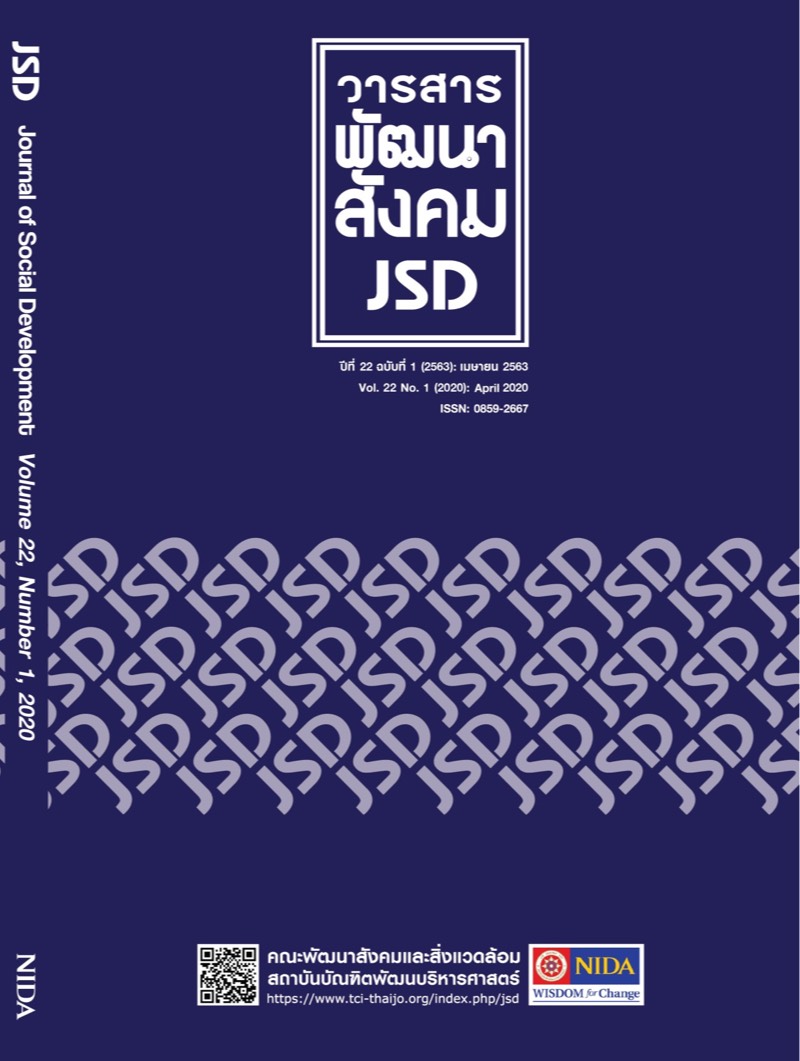The Formation of Civil Society in Southern of Thailand: Crisis or Opportunity for Environment Managementin Community
Main Article Content
Abstract
This paper aims to provide an understanding about the formation of civil society organizations in the Southern part of Thailand who oppose the development projects of the Thai Government through Michel Foucault’s concept of civil society.According to this concept, it would be possible to recognize how modern government exercises bio - power or micro - level power that formulates the subjectivity of individuals that are coincided with expectations of the government. Because the government desires to exert more control over the populations/space, in return, this encourages the formation of civil society or civil actor who is an active agent in the community.These individuals are able to effectively negotiate with the government, conscientiously preserve and use their local resources, and successfully delay the development projects for the benefit of their community and future generations.This paper, with qualitative methodology, will provide four examples of the governmental schemes that lead to the formation of a competent civil society in the Southern Thailand, which are Thepha Thermal Power Station, Songkhla II deep - sea port, Pak Bara deep - sea port, and Krabi power plant project. These four development projects represent governmental power to conduct of people conduct which the more they are under power, without realization, the more they oppose the projects. Finally, we hope that this paper will urge people to witness a new form of social movements in the modern society.
Article Details
How to Cite
Upatchar, B. . (2020). The Formation of Civil Society in Southern of Thailand: Crisis or Opportunity for Environment Managementin Community. Journal of Social Development and Management Strategy, 22(1), 123–141. retrieved from https://so04.tci-thaijo.org/index.php/jsd/article/view/241661
Section
บทความวิจัย Research Article
References
Burchell, G. (1991). Peculiar Interests: Civil Society and "Governing the System of Natural Liberty" Hemel Hempstead: HaversterWeatsheaf.
Bold, Christine. (2012). Using Narrative in Research.London: SAGE Publications.
Dean, M. (2010). Governmentality: Power and Rule in Modern Society (2 ed.). London: SAGE Publications.
Foucault, M. (1990). Right of Death and Power over Life (R. Hurley, Trans.) The History of Sexuality Volume 1 an Introduction. London: Penguin Books Ltd.
------------- (1991). Governmentality. In G. Burchell, C. Gordon & P. Miller (Eds.), The Foucault Effect: Studies in governmentality.Chicago: The University of Chicago Press.
----------- (2008). The Birth of Biopolitics. Lectures at College de France 1978-1979 (G. Burchell, Trans.). New York: Palgrave Macmillan.
Mckee, K. (2009). Post-Foucauldian Governmentality: What Does It Offer Critical Social Policy Analysis? Critical Social Policy29 (3), 467.
Phoenix, Ann. (2013). Analysing Narrative Contexts. Doing Narrative Research. Edited by Andrews, Molly; Squire, Corinne; &T amboukou, Maria. 2 ed. London: SAGE Publications.
Rose, N., & Miller, P. (2008). Governing the Present: Administering Economic, Social and Personal Life. Cambridge: Polity.
Bold, Christine. (2012). Using Narrative in Research.London: SAGE Publications.
Dean, M. (2010). Governmentality: Power and Rule in Modern Society (2 ed.). London: SAGE Publications.
Foucault, M. (1990). Right of Death and Power over Life (R. Hurley, Trans.) The History of Sexuality Volume 1 an Introduction. London: Penguin Books Ltd.
------------- (1991). Governmentality. In G. Burchell, C. Gordon & P. Miller (Eds.), The Foucault Effect: Studies in governmentality.Chicago: The University of Chicago Press.
----------- (2008). The Birth of Biopolitics. Lectures at College de France 1978-1979 (G. Burchell, Trans.). New York: Palgrave Macmillan.
Mckee, K. (2009). Post-Foucauldian Governmentality: What Does It Offer Critical Social Policy Analysis? Critical Social Policy29 (3), 467.
Phoenix, Ann. (2013). Analysing Narrative Contexts. Doing Narrative Research. Edited by Andrews, Molly; Squire, Corinne; &T amboukou, Maria. 2 ed. London: SAGE Publications.
Rose, N., & Miller, P. (2008). Governing the Present: Administering Economic, Social and Personal Life. Cambridge: Polity.


